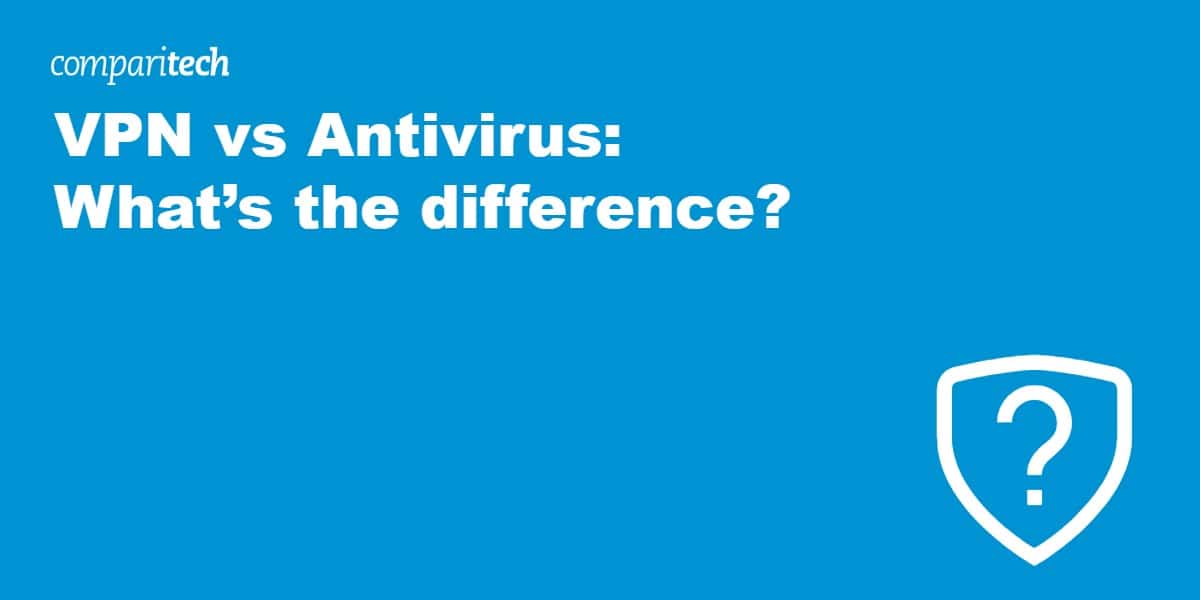Chances are you have an idea of what an antivirus is and what it does. However, you may be less familiar with a VPN (Virtual Private Network), the differences between these essential tools, and how they can secure your online activities. Knowing the difference between a VPN and an antivirus helps you better understand how to use them to improve your online defenses.
This post aims to clarify antivirus software and VPNs, comparing and contrasting their functionalities, key features, and common uses. We’ll then explore how they complement each other to provide more robust security defenses. Finally, we’ll touch upon some other security tools that further enhance the protection that a VPN and antivirus program provide.
What is an antivirus?
An antivirus is a software program that protects your device from malware. There are numerous types of malware, including viruses, worms, trojans, and spyware. An antivirus scans your device, specifically, its files and programs, to detect and eliminate malicious code that could harm the system or otherwise compromise your data.
What are some key features of antivirus software?
- Real-time malware protection
- Virus detection and removal
- Heuristic analysis (examining code for suspicious behavior)
- Phishing protection
- Automatic updates
- Scheduled and on-demand scans
- Firewall integration
What are some common uses of antivirus software?
- Protection against malware: Antivirus software is designed to detect, prevent, and ultimately remove malware. This may include viruses, worms, trojans, ransomware, and spyware. Antivirus programs run in the background to scan and remove these threats before they can cause harm by deleting data, hijacking device functions, or spying on your activity.
- Real-time scanning: A key feature of antivirus programs is real-time scanning, which continuously checks your system for malware. This proactive approach helps catch threats immediately, ensuring that an infected file doesn’t damage the system or spread to other devices.
- Phishing protection: Phishing scams are increasingly common and sophisticated. Antivirus software often includes features to identify and block phishing attempts. This is typically achieved through web filtering which blocks known phishing sites. Email scanning detects links or attachments that may contain phishing content or malware.
- System performance management: Some antivirus tools come with built-in performance optimization features. This allows them to manage system resources better. Common measures include managing which apps can run in the background, cleaning up unnecessary files, and providing reports on system performance.
- Scheduled and on-demand scans: In addition to real-time protection, antivirus software allows for scheduled and manual scans. You can run scans at the most convenient times to ensure minimal disruption.
What is a VPN?
A VPN, or Virtual Private Network, is a service that creates a secure and encrypted connection between your device and the internet. In encrypting your data and hiding your IP address, a VPN prevents hackers, your ISP, and even your government from seeing what you’re doing online.
Related: Benefits of a VPN
What are some key features of antivirus software?
- Encryption of data in transit
- IP address masking
- DNS leak protection
- Kill switch
- No-logs policy
- Location spoofing
What are some common uses of a VPN?
- Protect privacy: A growing number of people are choosing to use a VPN to protect their privacy, often due to the ever-increasing tracking of our online activities. A VPN routes your internet traffic through an encrypted tunnel that prevents websites, ISPs, and snoopers from tracking their browsing habits, downloads, search history, and personal information.
- Bypass restrictions: Location and other restrictions on content can be a major hurdle when you’re trying to access a specific website or service. A VPN addresses this by allowing you to connect to servers in other countries, making it look as if you’re browsing from another location. This is particularly useful when traveling abroad or if you live in a country with strict internet censorship.
- Secure remote access: As remote work becomes more common, VPNs have allowed employees to access their company’s network from anywhere safely. The security a VPN provides through the use of encryption is all the more necessary for organizations that handle sensitive data such as the personal information of clients or financial data.
- Safe use of public wifi: Public wifi networks are notoriously insecure, which makes them all the more vulnerable to cyber attacks such as man-in-the-middle attacks and packet sniffing. A VPN encrypts all of the traffic on your device, keeping your data secure. This prevents cybercriminals from intercepting sensitive information, be it passwords, emails, or credit card numbers.
What’s the difference between a VPN and an antivirus?
VPNs and antivirus software serve two different roles when it comes to cybersecurity. A VPN secures your data in transit as it passes between your device and the VPN server, preventing others from intercepting or spying on your online activities. It also hides your IP address to protect your anonymity online. This allows you to bypass geographic restrictions as well as censorship.
In contrast, antivirus software is designed to protect you from malware, including viruses, worms, trojans, and ransomware. It scans your files and applications to detect malicious software, blocks unsafe downloads, and removes detected malware. Furthermore, antivirus software often includes tools to protect against phishing attacks, monitor system performance, and ensure software is up to date.
VPNs provide a first layer of defense for data in transit, creating a secure tunnel between your device and the internet. This shields your personal information from being intercepted by cybercriminals, particularly when using unsecured public Wi-Fi networks. Antivirus software on the other hand, acts as a defense for data that’s already on your device. It continually scans for and removes threats, ensuring your device operates efficiently and remains free from malicious software that may lead to the loss or theft of data.
A VPN can’t scan your system or remove malware, and an antivirus can’t protect your privacy or help bypass online restrictions.
Why you should use a VPN and an antivirus
VPNs and antivirus software each address specific vulnerabilities. Together, they cover threats you may face at both the network and device level. Here are some of the threats that a VPN and antivirus program can combat:
Phishing
Antivirus applications play a vital role in protecting against phishing attacks by scanning emails and web pages for malicious links and attachments. A VPN secures your data through encryption but can’t do much to help if you provide personal information to a phishing site.
Data interception
VPNs are especially effective against data interception threats. By encrypting the data sent over the internet, VPNs ensure that the information remains unreadable and secure from hackers even if packets are intercepted during transmission. VPNs are effective against packet sniffing and man-in-the-middle attacks.
Malware and ransomware
Antivirus software excels in this area. It continuously scans a system for any signs of malware and ransomware, automatically isolating suspicious files and removing threats. It also provides real-time protection against the installation of malware from downloads, email attachments, or compromised websites. Although VPNs don’t directly combat malware (though some VPNs include an antivirus that does), they reduce the risk of you becoming a target by hiding your IP address. Some VPNs can block ads, trackers, and malware before they reach your device.
Unsecured wifi connections
VPNs are invaluable when connecting to public wifi networks as they encrypt your internet traffic. This prevents cybercriminals from exploiting vulnerabilities in the network to snoop on your activities or steal your data. Some antivirus software warns you about problematic networks or attempts to install malware.
Additional security tools to complement a VPN and antivirus
VPNs and antivirus software form a strong foundation for your security strategy. However, there are additional tools that can provide even more comprehensive protection. Here are a few tools to consider:
- Firewall: A firewall acts as a gatekeeper for your device or network. It monitors both incoming and outgoing traffic based on predetermined security rules.
- Two-factor authentication:Two-factor authentication adds a layer of security by requiring two verification forms before accessing accounts.
- Secure backup: Regularly backing up your data to a physical device or cloud-based service means that if there’s a data breach or hardware failure, you can restore it.
- Password manager: Password managers securely store your passwords. As such, you can have unique and complex passwords for all of your accounts without having to remember each one.
- Encrypted email: Encrypted email services provide end-to-end encryption so that only the sender and intended recipients can read the contents of an email.
Wrapping up
By using both a VPN and antivirus program, you can enjoy comprehensive protection through multiple layers of security that defend you from a variety of cyber threats. Indeed, while the VPN encrypts and anonymizes your internet traffic, the antivirus monitors your device for any signs of internal breaches or infections. The proactive nature of these defenses help safeguard from both known and emerging threats.
VPN vs Antivirus: FAQs
Can a VPN replace an antivirus program?
No, a VPN on its own can’t replace an antivirus program. A VPN has different functions from an antivirus program in that it secures your online activities by encrypting your internet connection and hiding your IP address. This protects your data from being intercepted as it travels between your device and the VPN server. However, a VPN doesn’t detect or remove malware from your device.
Some VPNs such as NordVPN and Surfshark have plans that include antivirus software. Aside from there being some VPNs with an antivirus included, you can find antivirus providers with a VPN.
What should I look for when choosing a VPN or antivirus?
When looking for a VPN, it’s important to look for strong encryption protocols as well as a no-logs policy. Beyond this, it depends on how you plan to use your VPN. If you want to use your VPN for more bandwidth-intensive activities such as streaming and online gaming, then you’ll want a VPN that provides fast, unthrottled speeds. If you regularly travel abroad and need to bypass content restrictions, then a VPN with servers in many countries may be preferred.
For antivirus software, real-time scanning is essential and ensures threats are identified and removed before they can do any harm. It’s also important to consider how much of your system’s resources the software uses and whether you want additional features such as a firewall or identity theft protection. Whichever antivirus provider you choose, it should provide regular updates to protect against new threats.
Can an antivirus block a VPN?
Yes, it’s possible for an antivirus to block a VPN, although it’s not very common. Some antivirus programs with a built-in firewall may interpret VPN traffic as suspicious due to the encryption and IP masking used. Strict firewall settings may block VPNs by default. Another circumstance in which an antivirus might block a VPN is when monitoring network activity.
Whatever the case, you can resolve VPN blocking by adjusting your firewall settings. You may need to allow VPN traffic or specifically whitelist the VPN software to prevent it being blocked. Be sure to keep both your VPN and antivirus software up to date. This resolves incompatibilities and any bugs that might cause blocking issues.
Is it necessary to have a VPN and antivirus on all devices?
Whether it’s necessary to have both a VPN and antivirus depends on the device, how you use it, and the level of security it needs. If you have sensitive data that you need to protect on your device, be it personal or professional, you may want both. This is particularly the case if you often access unfamiliar websites, download files, or use public wifi. In these cases, it’s a good idea to have extra protection in the form of a VPN and antivirus.









